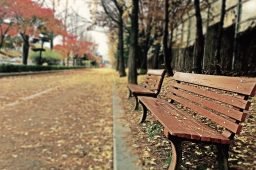Undoing Aloneness
- November 05, 2017
- by
- Joe Danehower
Today I worked remote, Ubered to pick up food I ordered on Grubhub, and Facetimed several friends who live less than a few miles from me. I watched Bojack Horseman on Netflix, bought a couple things from Amazon, and swiped Bumble looking for a date. In between those “activities,” I scrolled Instagram and sent a few awkward Snapchats.
Sound familiar?
Maybe the specifics don’t match up, but the facilitation or replacement of daily activities by apps and the internet is becoming the norm for many living in the smartphone age. There’s an incredible accessibility to food, work, entertainment, and relationships thanks to Silicon Valley striving to create assisted living for millennials. This obviously has it’s perks, but I believe there’s a hidden cost as well.
When our lives trend towards efficiency and “on demand” behavior, it adversely affects our involvement in natural community in what are often called “Third Places,” a term coined by the urban sociologist Ray Oldenburg. These third places are the grocery stores, office complexes, eateries, shopping malls, and entertainment centers where people for years have gathered and through daily living had to interact and participate in life together. People were usuals, walked the same roads, shopped at the same stores, and ate at the neighborhood restaurants. Yes, these things still are a part of our daily lives, but we know these interactions are quickly becoming less common. Our usual route is now the internet router, and we are more often “regulars” on a website or app, not the local storefront or grocery store. Our lives are incredibly efficient, but in achieving that efficiency we are also reducing our interaction and involvement with community. It’s easy to make it through a day, a week, entirely alone. Are we okay with that?
Many researchers have recently published papers highlighting the impacts of loneliness on physical and mental health. You don’t have to dive too deep into Google to find them. The former U.S. surgeon general has even publicly called loneliness an epidemic in our seemingly hyper connected society. Loneliness has been scientifically proven to increase depression and anxiety, obesity, and even aggressive and abusive behaviors. We wonder why our society feels increasingly fractured and irrationally violent, maybe loneliness is at least part of the cause.
If loneliness is a problem, and the internet and smartphones are adding to its prevalence, does that mean we trade in our internet routers for single speed bikes and delete our arsenal of “on demand” apps? I don’t think so, but instead I think it’s time we take our internet connectedness and use it to turn communities into something they have been and could be even more fully again.
We should commit ourselves to seeking out others in the mundane of our daily activities. We should consider our usage of apps and the internet, and learn how to pursue real relationships amid our surface level connectedness. We need to stop worshipping efficiency, and remember the people who make up the businesses and services we frequent. The cashier, waitress, or store clerk should matter more to us than a numeric review rating online. Those around us, even if not in our immediate friend groups or families, bear the image of God. They are not just a means to further our own efficiency. More than that, relationships are not meant to be efficient. Everyday usage of smartphones and social media can cause us to begin to see them as such. Let’s stop trying to force the depth and beauty of relationships into convenient and packaged interactions. Let’s see people for who they are. Let’s commit to learning each other’s stories, and I don’t mean on Instagram or Snapchat.
Recently, a few horrific acts that inundated the headlines referred to the perpetrator as a “Lone Wolf.” I don’t know if there’s anything more telling about the human condition than a real and tangible connection between “alone” and “rampant violent behavior.” We are made for relationship. Outside the context of relationship, it’s becoming increasingly clear how dark and calloused the human heart can grow.
When these horrific tragedies occur, we typically turn to the government or social structure for a solution, but maybe the solution to our fractured society is not top-down, but bottom-up. What if we committed to undoing aloneness? What if society as whole set out to find the lone wolves, and brought them into life altering and redeeming relationships. I can’t claim to know what Jesus would say or do amidst our current cultural climate, but I do know He is a fan of the upside down and the inside out. We may not have the reach or influence to change a nation, but we can change our communities. We can bring depth and knowing in relationship to those around us. We can leave the comfort of our couches and efficiency of online living, and go meet someone on common ground. Let’s not forget this is how Jesus loved us. He left Heaven to come here, to undo our aloneness. Let’s go and do likewise.






